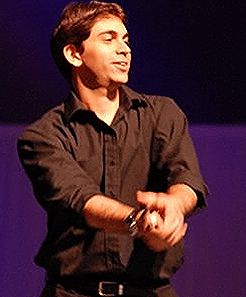
Attending a play at the New Plays for Young Audiences Festival of NYU's Steinhardt Program in Education Theatre is like peeking at the ultrasound of what will someday be a fully embodied creature. Now in its eighteenth season, New Plays for Young Audiences is famous for being the birthplace of theatrical ideas, where theatre artists conspire with audiences to experiment and flesh out new creations. This year’s plays include Mario and the Comet that Stopped the World by Gabriel Jason Dean, Nadine’s Coloring Book by Ashley Laverty and Forever Poppy by José Cruz González. Each play will get one week to rehearse and one weekend to perform "rehearsed readings," with scripts in the hands of actors and possibly entire sections of the play still unwritten.
The first play of the 2015 New Plays for Young Audiences Festival, Mario and the Comet that Stopped the World, already beams with a spirit of something truly memorable. With irresistibly sweet music and lyrics by the astute composer David Dabbon, award-winning playwright and lyricist of Mario and the Comet that Stopped the World, Gabriel Jason Dean, has sparked the embers of a potentially lasting blaze in the audience’s heart. Director Courtney Sale has painted the character’s inner lives with complexities and subtle hues, and then pulled those textures out in her actors. Under her direction, her actors achieved honesty, humor and sympathy. Deserving credit also goes to Gabriel Jason Dean’s wife, Jesse: “Those singing fungi are all her!” Yes, that’s right, singing fungi.
Singing fungi, cheeky yellow balloons, the Venedicci Comet and a chorus of rubber ducks all have a place in Mario’s world. Such elements make it sound like a cutesy tale whose sole purpose is to amuse children and make adults smile. Like all great children’s stories though, Mario and the Comet that Stopped the World amuses children, makes adults smile, but also gently breaks the hearts of both with just enough bittersweet, delicate tenderness that it leaves an impression on the psyche, à la Shel Silverstein’s The Giving Tree. The world seems sweeter, in all its sadness, after meeting little Mario, a precocious little boy who comforts himself from the loss of his mother by using his deeply vivid imagination.
In an interview with Gabriel Jason Dean and David Dabbon, I discover that my instincts are correct; this is a profoundly personal creation:

Even in these early days of Mario, he is a fleshed-out, beautifully complex, emotionally-layered character. Is there a real life inspiration for Mario?
Gabriel Jason Dean: Mario and the Comet originated because of my own mother’s sudden passing about three years back. She passed away from lung cancer, six weeks from diagnosis. In my adult life, I had a pretty stressful relationship with her. But when I was a young child, she was a terrific mother. I guess Mario became a way for me to remember the best version of my mother, to be the child she taught to dream once more.
She introduced me to literature and when she passed, I found myself unconsciously coming back to some of the stories she had passed on to me -- The Wizard of Oz, Where the Wild Things Are and others -- and as an adult searching those touchstone stories for some kind of comfort.
[My] characters tend to be pretty bossy. They know what they want their story to be and my job is to listen. Mario showed up and started singing -- a first for me. I didn’t exactly know what to do when that happened, so I put the play aside for a while. When I met David, I brought it back out to see if it was something that might interest him. Lucky for me, it did. It’s no coincidence that Mario sang. My mother also created my love of music.
The songs are happily infectious and catchy. Which came to you first -- the lyrics or melody?
David Dabbon: This was a really fun and different process for me. I have worked with Gabriel a lot and we have written some songs together for shows, but this was our first musical together. It changed over time but the consistent pattern was always starting with a germ of an idea and growing. Gabriel would write a whole set of lyrics which would inspire me to write something, from there that would make me spin off and write an additional part of lyrics.
When writing Mario and the Comet that Stopped the World, did you set out to address the issues of death and grief before the storyline developed?
Dean: It’s definitely intentional. When I first have an idea for a piece, I usually wait a while before writing anything, simply to see if it sticks with me. If it does, then it’s a story that I care about and one that I would want to see in the theatre. It takes me a long time to write a play, and I think that’s because I try my best to let the characters dictate the course of action the play takes, all the while knowing what thematic resonances I want to achieve. It takes great patience, trust and care on the part of my collaborators to let me work this way. I’m extremely grateful and lucky to have such keen colleagues as David and Courtney.

The music has a constant thread of hope. Did you make the choice to avoid ‘sad’ music since the play deals with death and grief?
Dabbon: Having bubbles of "hope" was really important for us, but to add to that, I think adding a layer of exploration was key -- never to allow the emotion to feel finite. My personal taste as a composer is to not be literal with the mood. Sometimes it is literal, but I think it's the battle between different emotions that makes it theatrical and playable for actors.
What is the next stage/plan for Mario and the Comet that Stopped the World?
Dean: After NPYA, we plan to finish the book and score and continue developing the script with Courtney. We will begin softly pitching it to theatres across the country both for development and production…so we shall see what happens.
New Plays for Young Audiences will present rehearsed readings of three new plays for young audiences June 6 – 21 at the Provincetown Playhouse.